Entrepreneurship Report: Venture Types, Brexit, and SME Importance
VerifiedAdded on 2020/07/23
|12
|4358
|62
Report
AI Summary
This report provides a comprehensive overview of entrepreneurship, examining various types of entrepreneurial ventures including small businesses, scalable startups, large companies, and social enterprises. It analyzes the similarities and differences between these ventures, highlighting their impact on the economy, with a specific focus on the role of small and medium-sized enterprises (SMEs). The report further explores the significance of SMEs and startups in the context of the UK after Brexit, discussing the challenges and opportunities presented by the changing economic landscape. It also addresses the characteristics, traits, and skills of successful entrepreneurs, and reflects on the motivations and mindset that drive entrepreneurial endeavors. Finally, the report considers the influence of background and experience on entrepreneurship.

ENTREPRENEURSHIP
Paraphrase This Document
Need a fresh take? Get an instant paraphrase of this document with our AI Paraphraser

Table of Contents
INTRODUCTION...........................................................................................................................1
TASK 1............................................................................................................................................1
LO1.............................................................................................................................................1
P1: Different types of entrepreneurial venture............................................................................1
P2: Differences & similarities between entrepreneurial ventures...............................................2
TASK 2............................................................................................................................................3
LO2.............................................................................................................................................3
P3: impact of small businesses on economy...............................................................................3
P4: Importance of SME's & Start ups after BREXIT.................................................................4
TASK 3............................................................................................................................................5
LO3.............................................................................................................................................5
P5: characteristics, traits & skills of entrepreneurs.....................................................................5
P6: Reflection on Entrepreneurial motivation & mindset...........................................................7
TASK 4............................................................................................................................................8
LO4:............................................................................................................................................8
P7: Effect of background & experience in entrepreneurship......................................................8
Conclusion:.................................................................................................................................9
References:.....................................................................................................................................10
INTRODUCTION...........................................................................................................................1
TASK 1............................................................................................................................................1
LO1.............................................................................................................................................1
P1: Different types of entrepreneurial venture............................................................................1
P2: Differences & similarities between entrepreneurial ventures...............................................2
TASK 2............................................................................................................................................3
LO2.............................................................................................................................................3
P3: impact of small businesses on economy...............................................................................3
P4: Importance of SME's & Start ups after BREXIT.................................................................4
TASK 3............................................................................................................................................5
LO3.............................................................................................................................................5
P5: characteristics, traits & skills of entrepreneurs.....................................................................5
P6: Reflection on Entrepreneurial motivation & mindset...........................................................7
TASK 4............................................................................................................................................8
LO4:............................................................................................................................................8
P7: Effect of background & experience in entrepreneurship......................................................8
Conclusion:.................................................................................................................................9
References:.....................................................................................................................................10
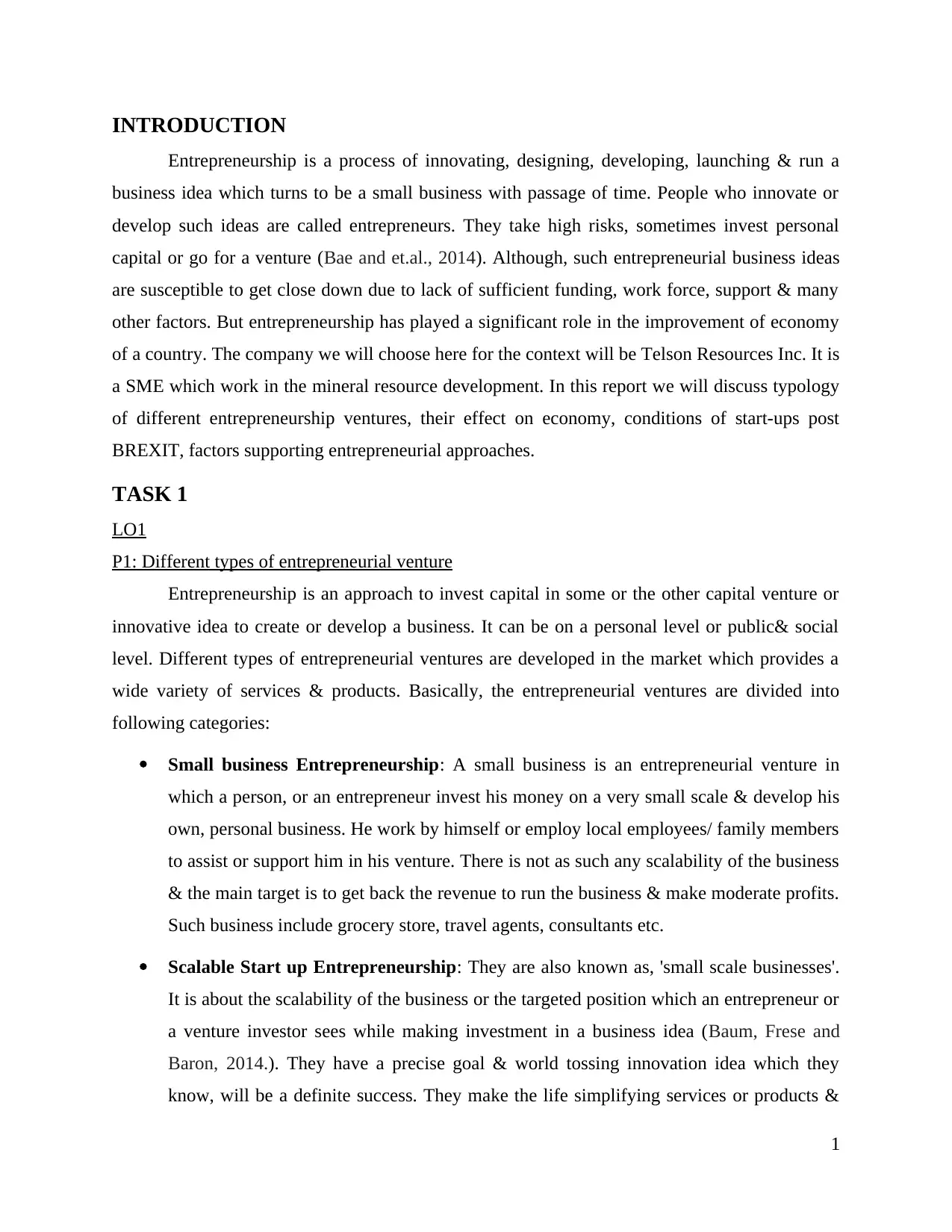
INTRODUCTION
Entrepreneurship is a process of innovating, designing, developing, launching & run a
business idea which turns to be a small business with passage of time. People who innovate or
develop such ideas are called entrepreneurs. They take high risks, sometimes invest personal
capital or go for a venture (Bae and et.al., 2014). Although, such entrepreneurial business ideas
are susceptible to get close down due to lack of sufficient funding, work force, support & many
other factors. But entrepreneurship has played a significant role in the improvement of economy
of a country. The company we will choose here for the context will be Telson Resources Inc. It is
a SME which work in the mineral resource development. In this report we will discuss typology
of different entrepreneurship ventures, their effect on economy, conditions of start-ups post
BREXIT, factors supporting entrepreneurial approaches.
TASK 1
LO1
P1: Different types of entrepreneurial venture
Entrepreneurship is an approach to invest capital in some or the other capital venture or
innovative idea to create or develop a business. It can be on a personal level or public& social
level. Different types of entrepreneurial ventures are developed in the market which provides a
wide variety of services & products. Basically, the entrepreneurial ventures are divided into
following categories:
Small business Entrepreneurship: A small business is an entrepreneurial venture in
which a person, or an entrepreneur invest his money on a very small scale & develop his
own, personal business. He work by himself or employ local employees/ family members
to assist or support him in his venture. There is not as such any scalability of the business
& the main target is to get back the revenue to run the business & make moderate profits.
Such business include grocery store, travel agents, consultants etc.
Scalable Start up Entrepreneurship: They are also known as, 'small scale businesses'.
It is about the scalability of the business or the targeted position which an entrepreneur or
a venture investor sees while making investment in a business idea (Baum, Frese and
Baron, 2014.). They have a precise goal & world tossing innovation idea which they
know, will be a definite success. They make the life simplifying services or products &
1
Entrepreneurship is a process of innovating, designing, developing, launching & run a
business idea which turns to be a small business with passage of time. People who innovate or
develop such ideas are called entrepreneurs. They take high risks, sometimes invest personal
capital or go for a venture (Bae and et.al., 2014). Although, such entrepreneurial business ideas
are susceptible to get close down due to lack of sufficient funding, work force, support & many
other factors. But entrepreneurship has played a significant role in the improvement of economy
of a country. The company we will choose here for the context will be Telson Resources Inc. It is
a SME which work in the mineral resource development. In this report we will discuss typology
of different entrepreneurship ventures, their effect on economy, conditions of start-ups post
BREXIT, factors supporting entrepreneurial approaches.
TASK 1
LO1
P1: Different types of entrepreneurial venture
Entrepreneurship is an approach to invest capital in some or the other capital venture or
innovative idea to create or develop a business. It can be on a personal level or public& social
level. Different types of entrepreneurial ventures are developed in the market which provides a
wide variety of services & products. Basically, the entrepreneurial ventures are divided into
following categories:
Small business Entrepreneurship: A small business is an entrepreneurial venture in
which a person, or an entrepreneur invest his money on a very small scale & develop his
own, personal business. He work by himself or employ local employees/ family members
to assist or support him in his venture. There is not as such any scalability of the business
& the main target is to get back the revenue to run the business & make moderate profits.
Such business include grocery store, travel agents, consultants etc.
Scalable Start up Entrepreneurship: They are also known as, 'small scale businesses'.
It is about the scalability of the business or the targeted position which an entrepreneur or
a venture investor sees while making investment in a business idea (Baum, Frese and
Baron, 2014.). They have a precise goal & world tossing innovation idea which they
know, will be a definite success. They make the life simplifying services or products &
1
⊘ This is a preview!⊘
Do you want full access?
Subscribe today to unlock all pages.

Trusted by 1+ million students worldwide
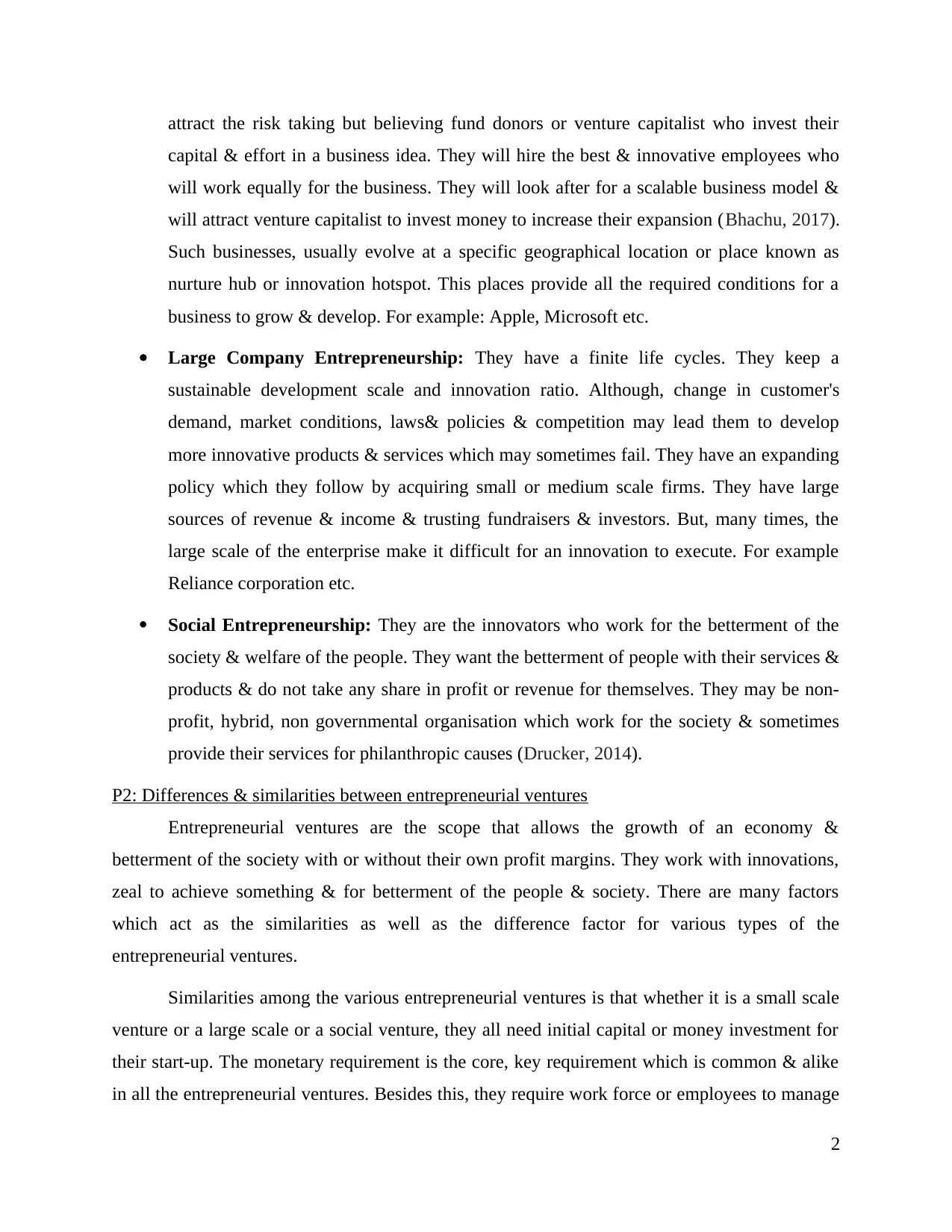
attract the risk taking but believing fund donors or venture capitalist who invest their
capital & effort in a business idea. They will hire the best & innovative employees who
will work equally for the business. They will look after for a scalable business model &
will attract venture capitalist to invest money to increase their expansion (Bhachu, 2017).
Such businesses, usually evolve at a specific geographical location or place known as
nurture hub or innovation hotspot. This places provide all the required conditions for a
business to grow & develop. For example: Apple, Microsoft etc.
Large Company Entrepreneurship: They have a finite life cycles. They keep a
sustainable development scale and innovation ratio. Although, change in customer's
demand, market conditions, laws& policies & competition may lead them to develop
more innovative products & services which may sometimes fail. They have an expanding
policy which they follow by acquiring small or medium scale firms. They have large
sources of revenue & income & trusting fundraisers & investors. But, many times, the
large scale of the enterprise make it difficult for an innovation to execute. For example
Reliance corporation etc.
Social Entrepreneurship: They are the innovators who work for the betterment of the
society & welfare of the people. They want the betterment of people with their services &
products & do not take any share in profit or revenue for themselves. They may be non-
profit, hybrid, non governmental organisation which work for the society & sometimes
provide their services for philanthropic causes (Drucker, 2014).
P2: Differences & similarities between entrepreneurial ventures
Entrepreneurial ventures are the scope that allows the growth of an economy &
betterment of the society with or without their own profit margins. They work with innovations,
zeal to achieve something & for betterment of the people & society. There are many factors
which act as the similarities as well as the difference factor for various types of the
entrepreneurial ventures.
Similarities among the various entrepreneurial ventures is that whether it is a small scale
venture or a large scale or a social venture, they all need initial capital or money investment for
their start-up. The monetary requirement is the core, key requirement which is common & alike
in all the entrepreneurial ventures. Besides this, they require work force or employees to manage
2
capital & effort in a business idea. They will hire the best & innovative employees who
will work equally for the business. They will look after for a scalable business model &
will attract venture capitalist to invest money to increase their expansion (Bhachu, 2017).
Such businesses, usually evolve at a specific geographical location or place known as
nurture hub or innovation hotspot. This places provide all the required conditions for a
business to grow & develop. For example: Apple, Microsoft etc.
Large Company Entrepreneurship: They have a finite life cycles. They keep a
sustainable development scale and innovation ratio. Although, change in customer's
demand, market conditions, laws& policies & competition may lead them to develop
more innovative products & services which may sometimes fail. They have an expanding
policy which they follow by acquiring small or medium scale firms. They have large
sources of revenue & income & trusting fundraisers & investors. But, many times, the
large scale of the enterprise make it difficult for an innovation to execute. For example
Reliance corporation etc.
Social Entrepreneurship: They are the innovators who work for the betterment of the
society & welfare of the people. They want the betterment of people with their services &
products & do not take any share in profit or revenue for themselves. They may be non-
profit, hybrid, non governmental organisation which work for the society & sometimes
provide their services for philanthropic causes (Drucker, 2014).
P2: Differences & similarities between entrepreneurial ventures
Entrepreneurial ventures are the scope that allows the growth of an economy &
betterment of the society with or without their own profit margins. They work with innovations,
zeal to achieve something & for betterment of the people & society. There are many factors
which act as the similarities as well as the difference factor for various types of the
entrepreneurial ventures.
Similarities among the various entrepreneurial ventures is that whether it is a small scale
venture or a large scale or a social venture, they all need initial capital or money investment for
their start-up. The monetary requirement is the core, key requirement which is common & alike
in all the entrepreneurial ventures. Besides this, they require work force or employees to manage
2
Paraphrase This Document
Need a fresh take? Get an instant paraphrase of this document with our AI Paraphraser
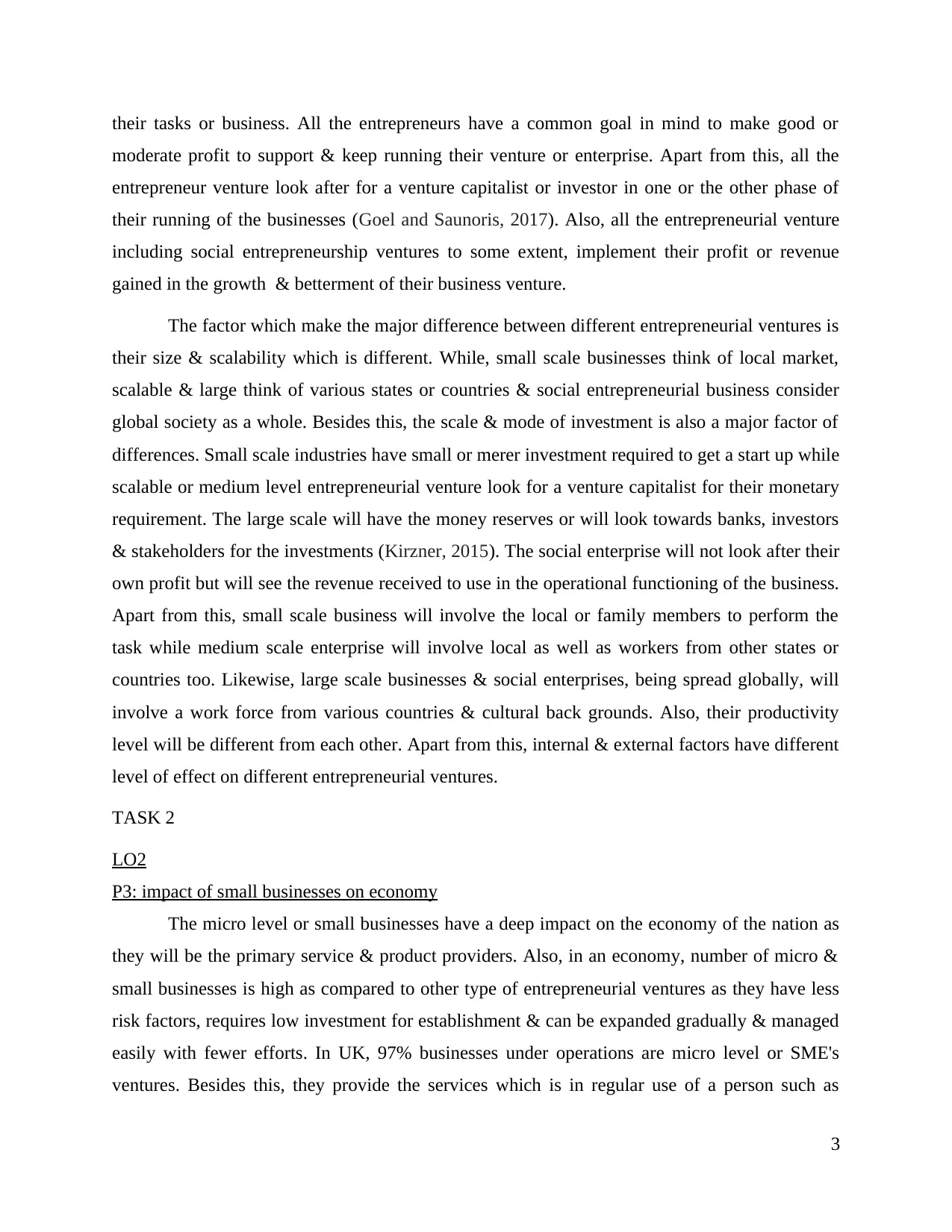
their tasks or business. All the entrepreneurs have a common goal in mind to make good or
moderate profit to support & keep running their venture or enterprise. Apart from this, all the
entrepreneur venture look after for a venture capitalist or investor in one or the other phase of
their running of the businesses (Goel and Saunoris, 2017). Also, all the entrepreneurial venture
including social entrepreneurship ventures to some extent, implement their profit or revenue
gained in the growth & betterment of their business venture.
The factor which make the major difference between different entrepreneurial ventures is
their size & scalability which is different. While, small scale businesses think of local market,
scalable & large think of various states or countries & social entrepreneurial business consider
global society as a whole. Besides this, the scale & mode of investment is also a major factor of
differences. Small scale industries have small or merer investment required to get a start up while
scalable or medium level entrepreneurial venture look for a venture capitalist for their monetary
requirement. The large scale will have the money reserves or will look towards banks, investors
& stakeholders for the investments (Kirzner, 2015). The social enterprise will not look after their
own profit but will see the revenue received to use in the operational functioning of the business.
Apart from this, small scale business will involve the local or family members to perform the
task while medium scale enterprise will involve local as well as workers from other states or
countries too. Likewise, large scale businesses & social enterprises, being spread globally, will
involve a work force from various countries & cultural back grounds. Also, their productivity
level will be different from each other. Apart from this, internal & external factors have different
level of effect on different entrepreneurial ventures.
TASK 2
LO2
P3: impact of small businesses on economy
The micro level or small businesses have a deep impact on the economy of the nation as
they will be the primary service & product providers. Also, in an economy, number of micro &
small businesses is high as compared to other type of entrepreneurial ventures as they have less
risk factors, requires low investment for establishment & can be expanded gradually & managed
easily with fewer efforts. In UK, 97% businesses under operations are micro level or SME's
ventures. Besides this, they provide the services which is in regular use of a person such as
3
moderate profit to support & keep running their venture or enterprise. Apart from this, all the
entrepreneur venture look after for a venture capitalist or investor in one or the other phase of
their running of the businesses (Goel and Saunoris, 2017). Also, all the entrepreneurial venture
including social entrepreneurship ventures to some extent, implement their profit or revenue
gained in the growth & betterment of their business venture.
The factor which make the major difference between different entrepreneurial ventures is
their size & scalability which is different. While, small scale businesses think of local market,
scalable & large think of various states or countries & social entrepreneurial business consider
global society as a whole. Besides this, the scale & mode of investment is also a major factor of
differences. Small scale industries have small or merer investment required to get a start up while
scalable or medium level entrepreneurial venture look for a venture capitalist for their monetary
requirement. The large scale will have the money reserves or will look towards banks, investors
& stakeholders for the investments (Kirzner, 2015). The social enterprise will not look after their
own profit but will see the revenue received to use in the operational functioning of the business.
Apart from this, small scale business will involve the local or family members to perform the
task while medium scale enterprise will involve local as well as workers from other states or
countries too. Likewise, large scale businesses & social enterprises, being spread globally, will
involve a work force from various countries & cultural back grounds. Also, their productivity
level will be different from each other. Apart from this, internal & external factors have different
level of effect on different entrepreneurial ventures.
TASK 2
LO2
P3: impact of small businesses on economy
The micro level or small businesses have a deep impact on the economy of the nation as
they will be the primary service & product providers. Also, in an economy, number of micro &
small businesses is high as compared to other type of entrepreneurial ventures as they have less
risk factors, requires low investment for establishment & can be expanded gradually & managed
easily with fewer efforts. In UK, 97% businesses under operations are micro level or SME's
ventures. Besides this, they provide the services which is in regular use of a person such as
3
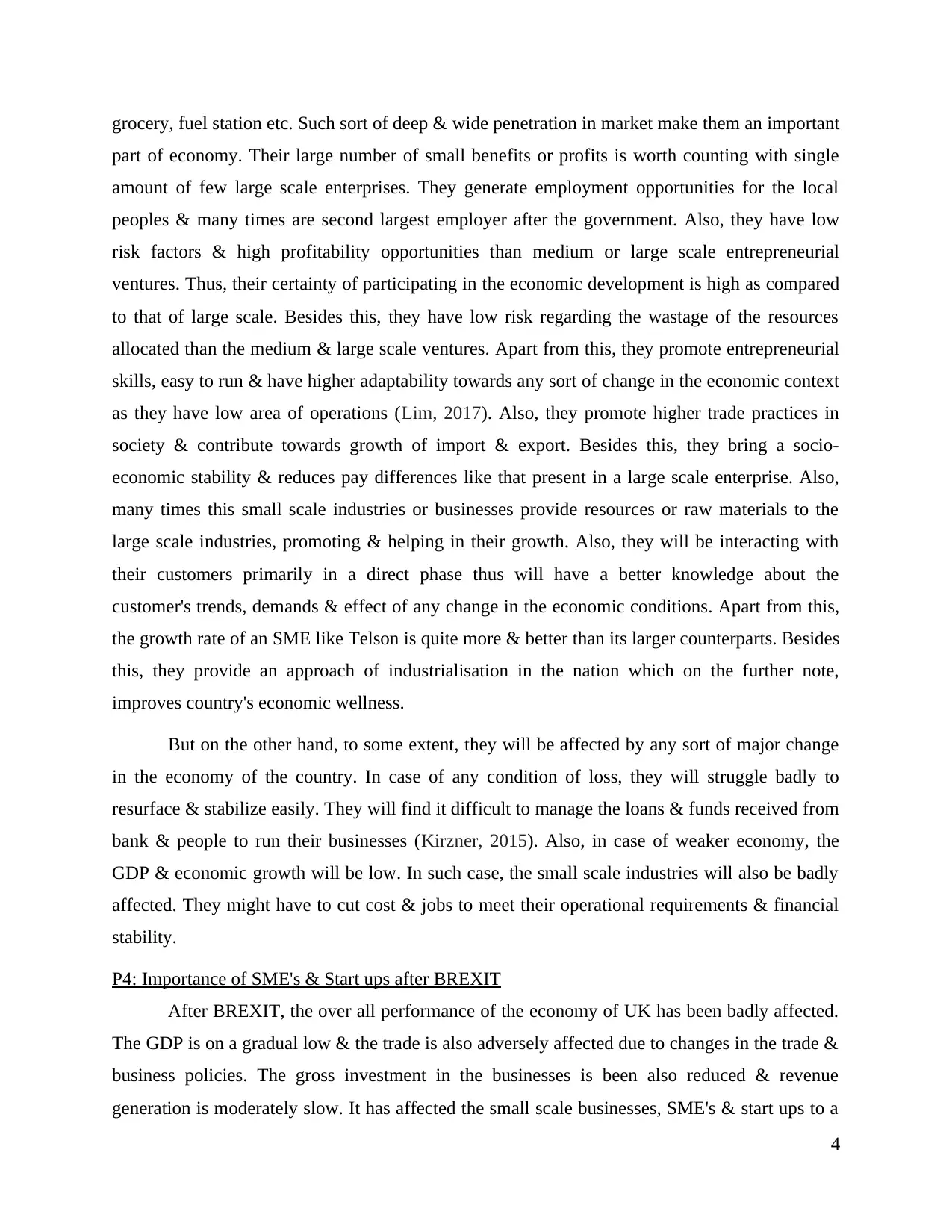
grocery, fuel station etc. Such sort of deep & wide penetration in market make them an important
part of economy. Their large number of small benefits or profits is worth counting with single
amount of few large scale enterprises. They generate employment opportunities for the local
peoples & many times are second largest employer after the government. Also, they have low
risk factors & high profitability opportunities than medium or large scale entrepreneurial
ventures. Thus, their certainty of participating in the economic development is high as compared
to that of large scale. Besides this, they have low risk regarding the wastage of the resources
allocated than the medium & large scale ventures. Apart from this, they promote entrepreneurial
skills, easy to run & have higher adaptability towards any sort of change in the economic context
as they have low area of operations (Lim, 2017). Also, they promote higher trade practices in
society & contribute towards growth of import & export. Besides this, they bring a socio-
economic stability & reduces pay differences like that present in a large scale enterprise. Also,
many times this small scale industries or businesses provide resources or raw materials to the
large scale industries, promoting & helping in their growth. Also, they will be interacting with
their customers primarily in a direct phase thus will have a better knowledge about the
customer's trends, demands & effect of any change in the economic conditions. Apart from this,
the growth rate of an SME like Telson is quite more & better than its larger counterparts. Besides
this, they provide an approach of industrialisation in the nation which on the further note,
improves country's economic wellness.
But on the other hand, to some extent, they will be affected by any sort of major change
in the economy of the country. In case of any condition of loss, they will struggle badly to
resurface & stabilize easily. They will find it difficult to manage the loans & funds received from
bank & people to run their businesses (Kirzner, 2015). Also, in case of weaker economy, the
GDP & economic growth will be low. In such case, the small scale industries will also be badly
affected. They might have to cut cost & jobs to meet their operational requirements & financial
stability.
P4: Importance of SME's & Start ups after BREXIT
After BREXIT, the over all performance of the economy of UK has been badly affected.
The GDP is on a gradual low & the trade is also adversely affected due to changes in the trade &
business policies. The gross investment in the businesses is been also reduced & revenue
generation is moderately slow. It has affected the small scale businesses, SME's & start ups to a
4
part of economy. Their large number of small benefits or profits is worth counting with single
amount of few large scale enterprises. They generate employment opportunities for the local
peoples & many times are second largest employer after the government. Also, they have low
risk factors & high profitability opportunities than medium or large scale entrepreneurial
ventures. Thus, their certainty of participating in the economic development is high as compared
to that of large scale. Besides this, they have low risk regarding the wastage of the resources
allocated than the medium & large scale ventures. Apart from this, they promote entrepreneurial
skills, easy to run & have higher adaptability towards any sort of change in the economic context
as they have low area of operations (Lim, 2017). Also, they promote higher trade practices in
society & contribute towards growth of import & export. Besides this, they bring a socio-
economic stability & reduces pay differences like that present in a large scale enterprise. Also,
many times this small scale industries or businesses provide resources or raw materials to the
large scale industries, promoting & helping in their growth. Also, they will be interacting with
their customers primarily in a direct phase thus will have a better knowledge about the
customer's trends, demands & effect of any change in the economic conditions. Apart from this,
the growth rate of an SME like Telson is quite more & better than its larger counterparts. Besides
this, they provide an approach of industrialisation in the nation which on the further note,
improves country's economic wellness.
But on the other hand, to some extent, they will be affected by any sort of major change
in the economy of the country. In case of any condition of loss, they will struggle badly to
resurface & stabilize easily. They will find it difficult to manage the loans & funds received from
bank & people to run their businesses (Kirzner, 2015). Also, in case of weaker economy, the
GDP & economic growth will be low. In such case, the small scale industries will also be badly
affected. They might have to cut cost & jobs to meet their operational requirements & financial
stability.
P4: Importance of SME's & Start ups after BREXIT
After BREXIT, the over all performance of the economy of UK has been badly affected.
The GDP is on a gradual low & the trade is also adversely affected due to changes in the trade &
business policies. The gross investment in the businesses is been also reduced & revenue
generation is moderately slow. It has affected the small scale businesses, SME's & start ups to a
4
⊘ This is a preview!⊘
Do you want full access?
Subscribe today to unlock all pages.

Trusted by 1+ million students worldwide
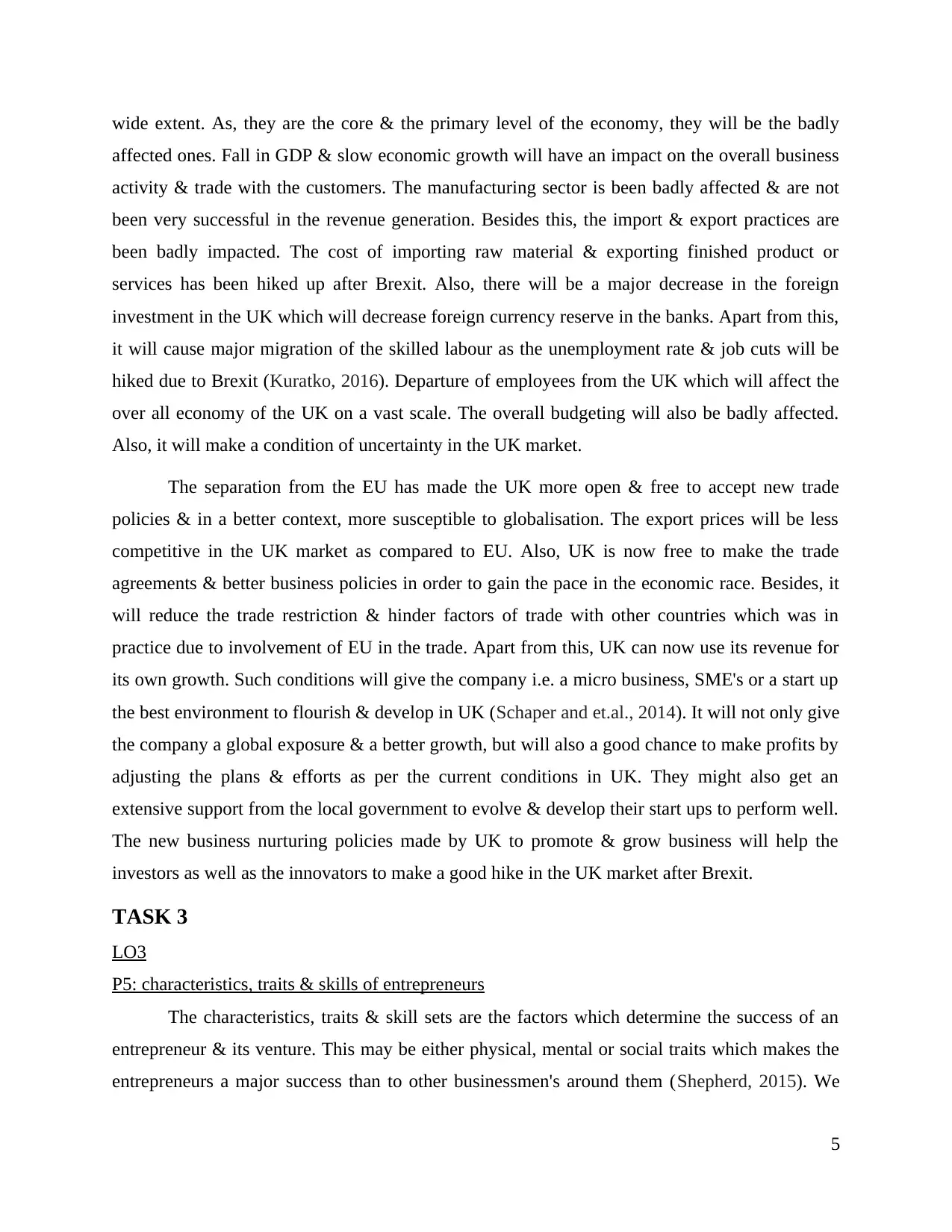
wide extent. As, they are the core & the primary level of the economy, they will be the badly
affected ones. Fall in GDP & slow economic growth will have an impact on the overall business
activity & trade with the customers. The manufacturing sector is been badly affected & are not
been very successful in the revenue generation. Besides this, the import & export practices are
been badly impacted. The cost of importing raw material & exporting finished product or
services has been hiked up after Brexit. Also, there will be a major decrease in the foreign
investment in the UK which will decrease foreign currency reserve in the banks. Apart from this,
it will cause major migration of the skilled labour as the unemployment rate & job cuts will be
hiked due to Brexit (Kuratko, 2016). Departure of employees from the UK which will affect the
over all economy of the UK on a vast scale. The overall budgeting will also be badly affected.
Also, it will make a condition of uncertainty in the UK market.
The separation from the EU has made the UK more open & free to accept new trade
policies & in a better context, more susceptible to globalisation. The export prices will be less
competitive in the UK market as compared to EU. Also, UK is now free to make the trade
agreements & better business policies in order to gain the pace in the economic race. Besides, it
will reduce the trade restriction & hinder factors of trade with other countries which was in
practice due to involvement of EU in the trade. Apart from this, UK can now use its revenue for
its own growth. Such conditions will give the company i.e. a micro business, SME's or a start up
the best environment to flourish & develop in UK (Schaper and et.al., 2014). It will not only give
the company a global exposure & a better growth, but will also a good chance to make profits by
adjusting the plans & efforts as per the current conditions in UK. They might also get an
extensive support from the local government to evolve & develop their start ups to perform well.
The new business nurturing policies made by UK to promote & grow business will help the
investors as well as the innovators to make a good hike in the UK market after Brexit.
TASK 3
LO3
P5: characteristics, traits & skills of entrepreneurs
The characteristics, traits & skill sets are the factors which determine the success of an
entrepreneur & its venture. This may be either physical, mental or social traits which makes the
entrepreneurs a major success than to other businessmen's around them (Shepherd, 2015). We
5
affected ones. Fall in GDP & slow economic growth will have an impact on the overall business
activity & trade with the customers. The manufacturing sector is been badly affected & are not
been very successful in the revenue generation. Besides this, the import & export practices are
been badly impacted. The cost of importing raw material & exporting finished product or
services has been hiked up after Brexit. Also, there will be a major decrease in the foreign
investment in the UK which will decrease foreign currency reserve in the banks. Apart from this,
it will cause major migration of the skilled labour as the unemployment rate & job cuts will be
hiked due to Brexit (Kuratko, 2016). Departure of employees from the UK which will affect the
over all economy of the UK on a vast scale. The overall budgeting will also be badly affected.
Also, it will make a condition of uncertainty in the UK market.
The separation from the EU has made the UK more open & free to accept new trade
policies & in a better context, more susceptible to globalisation. The export prices will be less
competitive in the UK market as compared to EU. Also, UK is now free to make the trade
agreements & better business policies in order to gain the pace in the economic race. Besides, it
will reduce the trade restriction & hinder factors of trade with other countries which was in
practice due to involvement of EU in the trade. Apart from this, UK can now use its revenue for
its own growth. Such conditions will give the company i.e. a micro business, SME's or a start up
the best environment to flourish & develop in UK (Schaper and et.al., 2014). It will not only give
the company a global exposure & a better growth, but will also a good chance to make profits by
adjusting the plans & efforts as per the current conditions in UK. They might also get an
extensive support from the local government to evolve & develop their start ups to perform well.
The new business nurturing policies made by UK to promote & grow business will help the
investors as well as the innovators to make a good hike in the UK market after Brexit.
TASK 3
LO3
P5: characteristics, traits & skills of entrepreneurs
The characteristics, traits & skill sets are the factors which determine the success of an
entrepreneur & its venture. This may be either physical, mental or social traits which makes the
entrepreneurs a major success than to other businessmen's around them (Shepherd, 2015). We
5
Paraphrase This Document
Need a fresh take? Get an instant paraphrase of this document with our AI Paraphraser
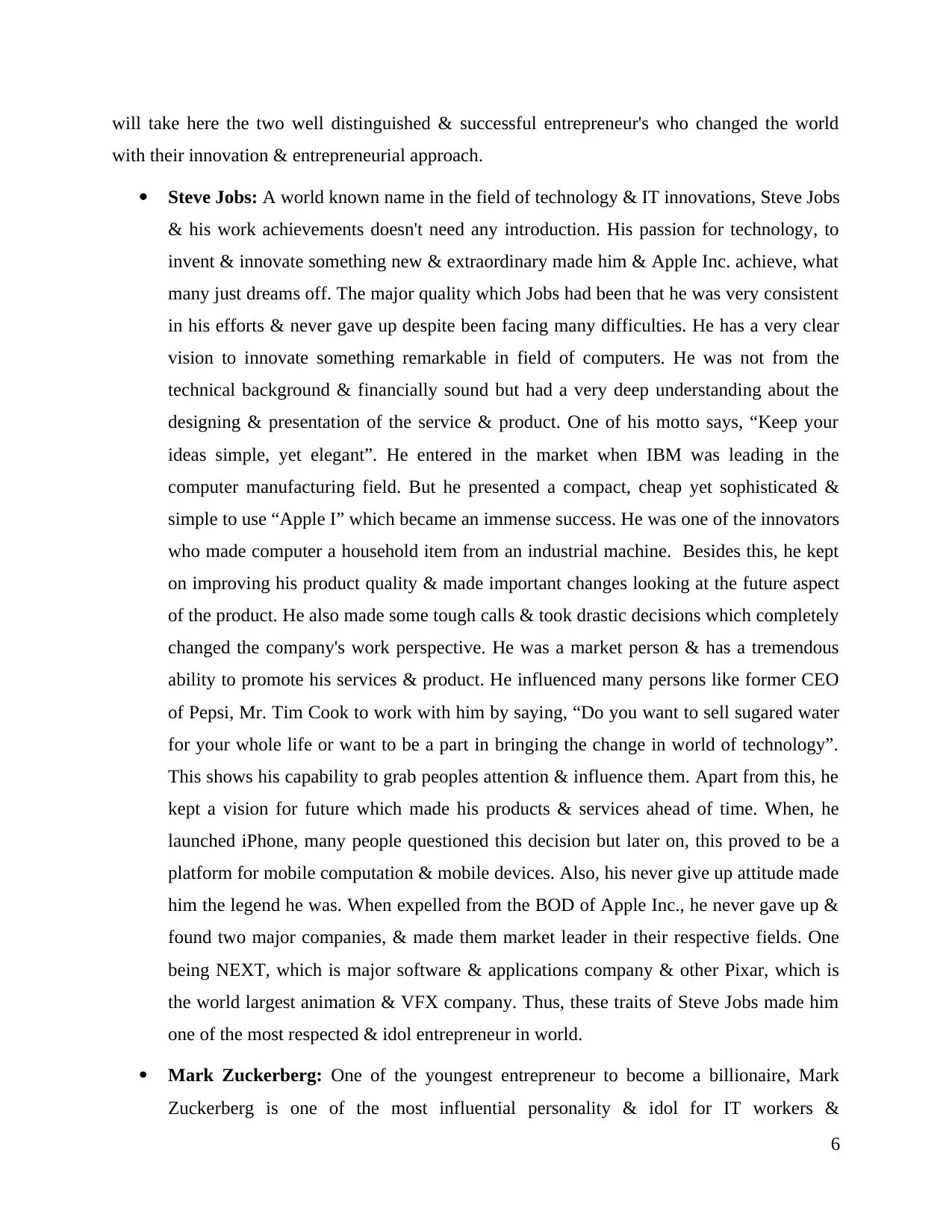
will take here the two well distinguished & successful entrepreneur's who changed the world
with their innovation & entrepreneurial approach.
Steve Jobs: A world known name in the field of technology & IT innovations, Steve Jobs
& his work achievements doesn't need any introduction. His passion for technology, to
invent & innovate something new & extraordinary made him & Apple Inc. achieve, what
many just dreams off. The major quality which Jobs had been that he was very consistent
in his efforts & never gave up despite been facing many difficulties. He has a very clear
vision to innovate something remarkable in field of computers. He was not from the
technical background & financially sound but had a very deep understanding about the
designing & presentation of the service & product. One of his motto says, “Keep your
ideas simple, yet elegant”. He entered in the market when IBM was leading in the
computer manufacturing field. But he presented a compact, cheap yet sophisticated &
simple to use “Apple I” which became an immense success. He was one of the innovators
who made computer a household item from an industrial machine. Besides this, he kept
on improving his product quality & made important changes looking at the future aspect
of the product. He also made some tough calls & took drastic decisions which completely
changed the company's work perspective. He was a market person & has a tremendous
ability to promote his services & product. He influenced many persons like former CEO
of Pepsi, Mr. Tim Cook to work with him by saying, “Do you want to sell sugared water
for your whole life or want to be a part in bringing the change in world of technology”.
This shows his capability to grab peoples attention & influence them. Apart from this, he
kept a vision for future which made his products & services ahead of time. When, he
launched iPhone, many people questioned this decision but later on, this proved to be a
platform for mobile computation & mobile devices. Also, his never give up attitude made
him the legend he was. When expelled from the BOD of Apple Inc., he never gave up &
found two major companies, & made them market leader in their respective fields. One
being NEXT, which is major software & applications company & other Pixar, which is
the world largest animation & VFX company. Thus, these traits of Steve Jobs made him
one of the most respected & idol entrepreneur in world.
Mark Zuckerberg: One of the youngest entrepreneur to become a billionaire, Mark
Zuckerberg is one of the most influential personality & idol for IT workers &
6
with their innovation & entrepreneurial approach.
Steve Jobs: A world known name in the field of technology & IT innovations, Steve Jobs
& his work achievements doesn't need any introduction. His passion for technology, to
invent & innovate something new & extraordinary made him & Apple Inc. achieve, what
many just dreams off. The major quality which Jobs had been that he was very consistent
in his efforts & never gave up despite been facing many difficulties. He has a very clear
vision to innovate something remarkable in field of computers. He was not from the
technical background & financially sound but had a very deep understanding about the
designing & presentation of the service & product. One of his motto says, “Keep your
ideas simple, yet elegant”. He entered in the market when IBM was leading in the
computer manufacturing field. But he presented a compact, cheap yet sophisticated &
simple to use “Apple I” which became an immense success. He was one of the innovators
who made computer a household item from an industrial machine. Besides this, he kept
on improving his product quality & made important changes looking at the future aspect
of the product. He also made some tough calls & took drastic decisions which completely
changed the company's work perspective. He was a market person & has a tremendous
ability to promote his services & product. He influenced many persons like former CEO
of Pepsi, Mr. Tim Cook to work with him by saying, “Do you want to sell sugared water
for your whole life or want to be a part in bringing the change in world of technology”.
This shows his capability to grab peoples attention & influence them. Apart from this, he
kept a vision for future which made his products & services ahead of time. When, he
launched iPhone, many people questioned this decision but later on, this proved to be a
platform for mobile computation & mobile devices. Also, his never give up attitude made
him the legend he was. When expelled from the BOD of Apple Inc., he never gave up &
found two major companies, & made them market leader in their respective fields. One
being NEXT, which is major software & applications company & other Pixar, which is
the world largest animation & VFX company. Thus, these traits of Steve Jobs made him
one of the most respected & idol entrepreneur in world.
Mark Zuckerberg: One of the youngest entrepreneur to become a billionaire, Mark
Zuckerberg is one of the most influential personality & idol for IT workers &
6
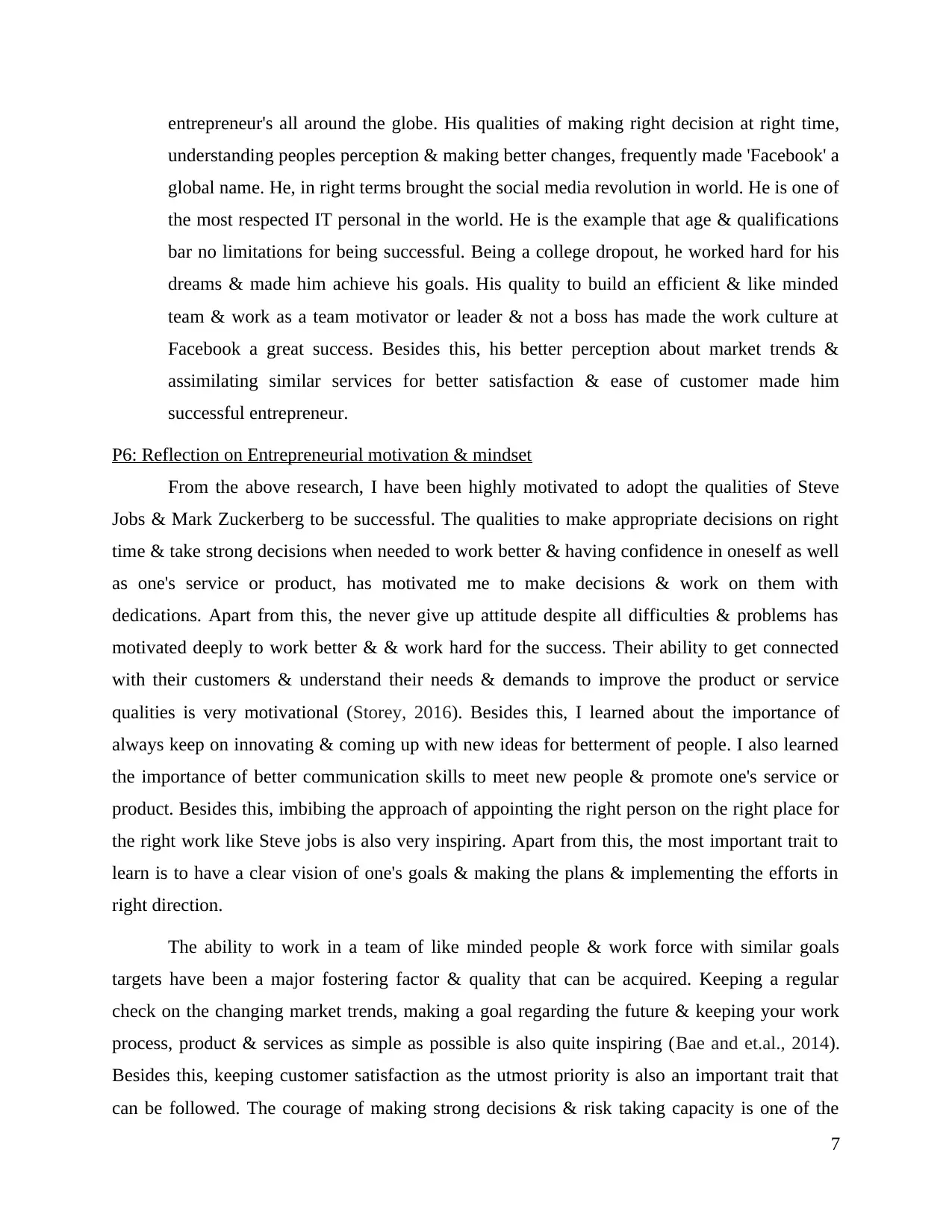
entrepreneur's all around the globe. His qualities of making right decision at right time,
understanding peoples perception & making better changes, frequently made 'Facebook' a
global name. He, in right terms brought the social media revolution in world. He is one of
the most respected IT personal in the world. He is the example that age & qualifications
bar no limitations for being successful. Being a college dropout, he worked hard for his
dreams & made him achieve his goals. His quality to build an efficient & like minded
team & work as a team motivator or leader & not a boss has made the work culture at
Facebook a great success. Besides this, his better perception about market trends &
assimilating similar services for better satisfaction & ease of customer made him
successful entrepreneur.
P6: Reflection on Entrepreneurial motivation & mindset
From the above research, I have been highly motivated to adopt the qualities of Steve
Jobs & Mark Zuckerberg to be successful. The qualities to make appropriate decisions on right
time & take strong decisions when needed to work better & having confidence in oneself as well
as one's service or product, has motivated me to make decisions & work on them with
dedications. Apart from this, the never give up attitude despite all difficulties & problems has
motivated deeply to work better & & work hard for the success. Their ability to get connected
with their customers & understand their needs & demands to improve the product or service
qualities is very motivational (Storey, 2016). Besides this, I learned about the importance of
always keep on innovating & coming up with new ideas for betterment of people. I also learned
the importance of better communication skills to meet new people & promote one's service or
product. Besides this, imbibing the approach of appointing the right person on the right place for
the right work like Steve jobs is also very inspiring. Apart from this, the most important trait to
learn is to have a clear vision of one's goals & making the plans & implementing the efforts in
right direction.
The ability to work in a team of like minded people & work force with similar goals
targets have been a major fostering factor & quality that can be acquired. Keeping a regular
check on the changing market trends, making a goal regarding the future & keeping your work
process, product & services as simple as possible is also quite inspiring (Bae and et.al., 2014).
Besides this, keeping customer satisfaction as the utmost priority is also an important trait that
can be followed. The courage of making strong decisions & risk taking capacity is one of the
7
understanding peoples perception & making better changes, frequently made 'Facebook' a
global name. He, in right terms brought the social media revolution in world. He is one of
the most respected IT personal in the world. He is the example that age & qualifications
bar no limitations for being successful. Being a college dropout, he worked hard for his
dreams & made him achieve his goals. His quality to build an efficient & like minded
team & work as a team motivator or leader & not a boss has made the work culture at
Facebook a great success. Besides this, his better perception about market trends &
assimilating similar services for better satisfaction & ease of customer made him
successful entrepreneur.
P6: Reflection on Entrepreneurial motivation & mindset
From the above research, I have been highly motivated to adopt the qualities of Steve
Jobs & Mark Zuckerberg to be successful. The qualities to make appropriate decisions on right
time & take strong decisions when needed to work better & having confidence in oneself as well
as one's service or product, has motivated me to make decisions & work on them with
dedications. Apart from this, the never give up attitude despite all difficulties & problems has
motivated deeply to work better & & work hard for the success. Their ability to get connected
with their customers & understand their needs & demands to improve the product or service
qualities is very motivational (Storey, 2016). Besides this, I learned about the importance of
always keep on innovating & coming up with new ideas for betterment of people. I also learned
the importance of better communication skills to meet new people & promote one's service or
product. Besides this, imbibing the approach of appointing the right person on the right place for
the right work like Steve jobs is also very inspiring. Apart from this, the most important trait to
learn is to have a clear vision of one's goals & making the plans & implementing the efforts in
right direction.
The ability to work in a team of like minded people & work force with similar goals
targets have been a major fostering factor & quality that can be acquired. Keeping a regular
check on the changing market trends, making a goal regarding the future & keeping your work
process, product & services as simple as possible is also quite inspiring (Bae and et.al., 2014).
Besides this, keeping customer satisfaction as the utmost priority is also an important trait that
can be followed. The courage of making strong decisions & risk taking capacity is one of the
7
⊘ This is a preview!⊘
Do you want full access?
Subscribe today to unlock all pages.

Trusted by 1+ million students worldwide
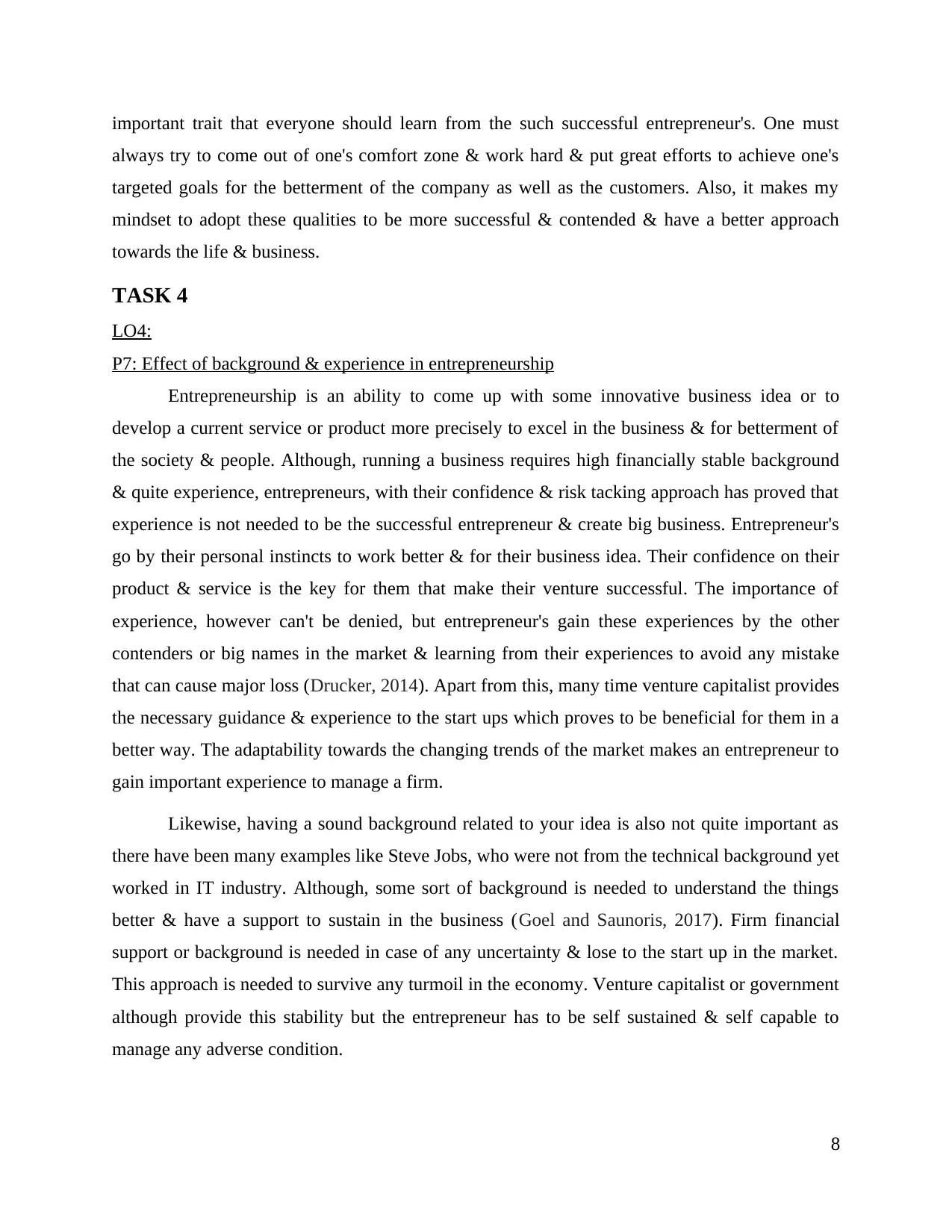
important trait that everyone should learn from the such successful entrepreneur's. One must
always try to come out of one's comfort zone & work hard & put great efforts to achieve one's
targeted goals for the betterment of the company as well as the customers. Also, it makes my
mindset to adopt these qualities to be more successful & contended & have a better approach
towards the life & business.
TASK 4
LO4:
P7: Effect of background & experience in entrepreneurship
Entrepreneurship is an ability to come up with some innovative business idea or to
develop a current service or product more precisely to excel in the business & for betterment of
the society & people. Although, running a business requires high financially stable background
& quite experience, entrepreneurs, with their confidence & risk tacking approach has proved that
experience is not needed to be the successful entrepreneur & create big business. Entrepreneur's
go by their personal instincts to work better & for their business idea. Their confidence on their
product & service is the key for them that make their venture successful. The importance of
experience, however can't be denied, but entrepreneur's gain these experiences by the other
contenders or big names in the market & learning from their experiences to avoid any mistake
that can cause major loss (Drucker, 2014). Apart from this, many time venture capitalist provides
the necessary guidance & experience to the start ups which proves to be beneficial for them in a
better way. The adaptability towards the changing trends of the market makes an entrepreneur to
gain important experience to manage a firm.
Likewise, having a sound background related to your idea is also not quite important as
there have been many examples like Steve Jobs, who were not from the technical background yet
worked in IT industry. Although, some sort of background is needed to understand the things
better & have a support to sustain in the business (Goel and Saunoris, 2017). Firm financial
support or background is needed in case of any uncertainty & lose to the start up in the market.
This approach is needed to survive any turmoil in the economy. Venture capitalist or government
although provide this stability but the entrepreneur has to be self sustained & self capable to
manage any adverse condition.
8
always try to come out of one's comfort zone & work hard & put great efforts to achieve one's
targeted goals for the betterment of the company as well as the customers. Also, it makes my
mindset to adopt these qualities to be more successful & contended & have a better approach
towards the life & business.
TASK 4
LO4:
P7: Effect of background & experience in entrepreneurship
Entrepreneurship is an ability to come up with some innovative business idea or to
develop a current service or product more precisely to excel in the business & for betterment of
the society & people. Although, running a business requires high financially stable background
& quite experience, entrepreneurs, with their confidence & risk tacking approach has proved that
experience is not needed to be the successful entrepreneur & create big business. Entrepreneur's
go by their personal instincts to work better & for their business idea. Their confidence on their
product & service is the key for them that make their venture successful. The importance of
experience, however can't be denied, but entrepreneur's gain these experiences by the other
contenders or big names in the market & learning from their experiences to avoid any mistake
that can cause major loss (Drucker, 2014). Apart from this, many time venture capitalist provides
the necessary guidance & experience to the start ups which proves to be beneficial for them in a
better way. The adaptability towards the changing trends of the market makes an entrepreneur to
gain important experience to manage a firm.
Likewise, having a sound background related to your idea is also not quite important as
there have been many examples like Steve Jobs, who were not from the technical background yet
worked in IT industry. Although, some sort of background is needed to understand the things
better & have a support to sustain in the business (Goel and Saunoris, 2017). Firm financial
support or background is needed in case of any uncertainty & lose to the start up in the market.
This approach is needed to survive any turmoil in the economy. Venture capitalist or government
although provide this stability but the entrepreneur has to be self sustained & self capable to
manage any adverse condition.
8
Paraphrase This Document
Need a fresh take? Get an instant paraphrase of this document with our AI Paraphraser
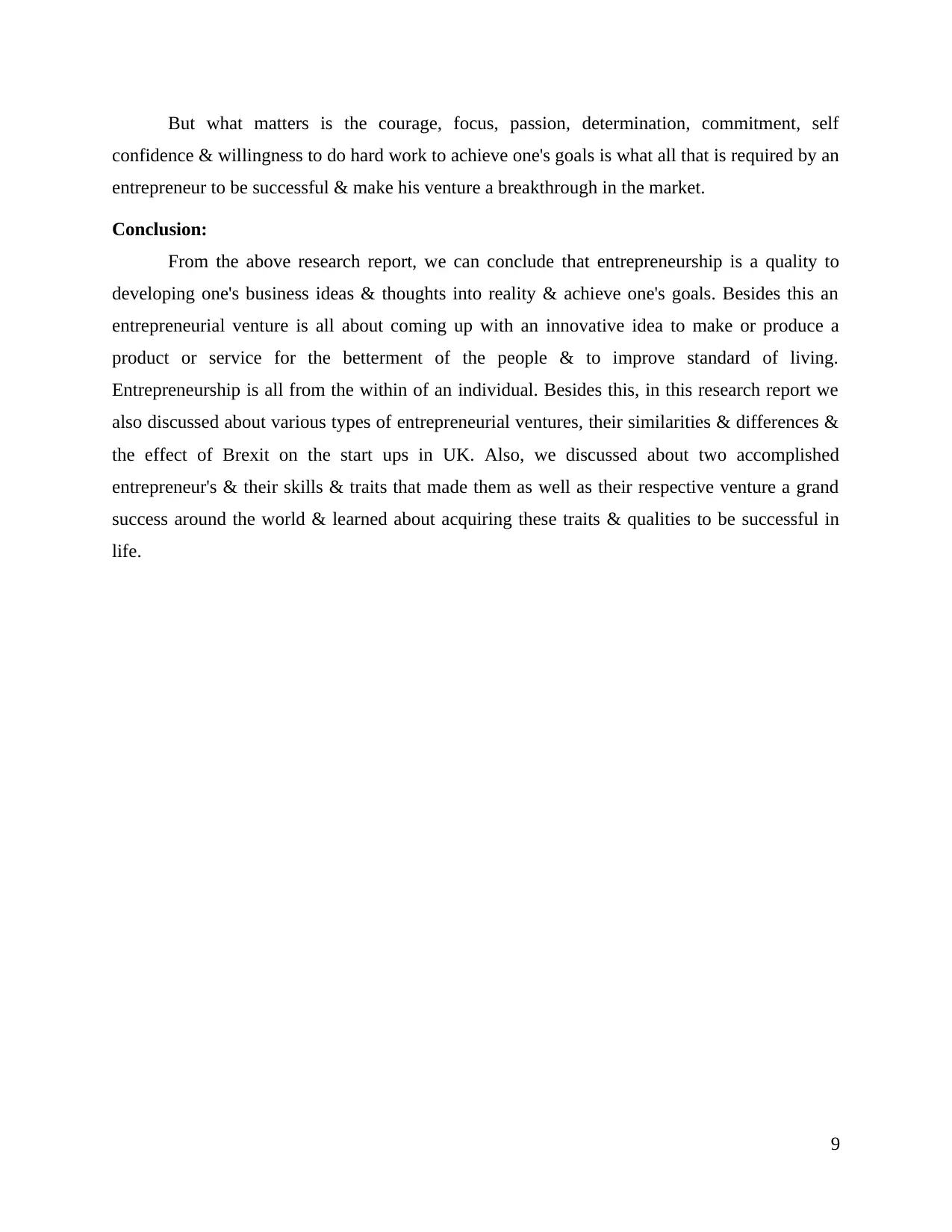
But what matters is the courage, focus, passion, determination, commitment, self
confidence & willingness to do hard work to achieve one's goals is what all that is required by an
entrepreneur to be successful & make his venture a breakthrough in the market.
Conclusion:
From the above research report, we can conclude that entrepreneurship is a quality to
developing one's business ideas & thoughts into reality & achieve one's goals. Besides this an
entrepreneurial venture is all about coming up with an innovative idea to make or produce a
product or service for the betterment of the people & to improve standard of living.
Entrepreneurship is all from the within of an individual. Besides this, in this research report we
also discussed about various types of entrepreneurial ventures, their similarities & differences &
the effect of Brexit on the start ups in UK. Also, we discussed about two accomplished
entrepreneur's & their skills & traits that made them as well as their respective venture a grand
success around the world & learned about acquiring these traits & qualities to be successful in
life.
9
confidence & willingness to do hard work to achieve one's goals is what all that is required by an
entrepreneur to be successful & make his venture a breakthrough in the market.
Conclusion:
From the above research report, we can conclude that entrepreneurship is a quality to
developing one's business ideas & thoughts into reality & achieve one's goals. Besides this an
entrepreneurial venture is all about coming up with an innovative idea to make or produce a
product or service for the betterment of the people & to improve standard of living.
Entrepreneurship is all from the within of an individual. Besides this, in this research report we
also discussed about various types of entrepreneurial ventures, their similarities & differences &
the effect of Brexit on the start ups in UK. Also, we discussed about two accomplished
entrepreneur's & their skills & traits that made them as well as their respective venture a grand
success around the world & learned about acquiring these traits & qualities to be successful in
life.
9
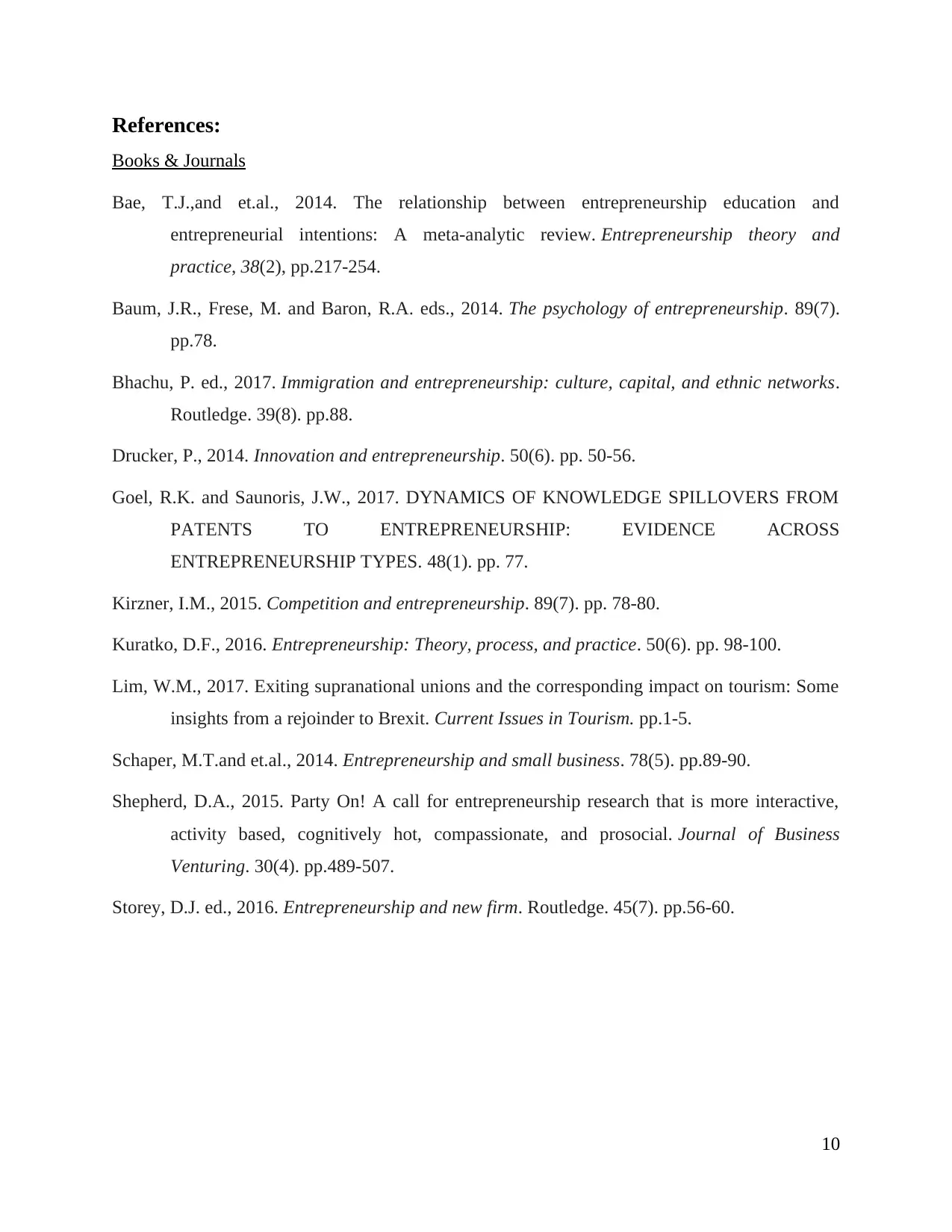
References:
Books & Journals
Bae, T.J.,and et.al., 2014. The relationship between entrepreneurship education and
entrepreneurial intentions: A meta‐analytic review. Entrepreneurship theory and
practice, 38(2), pp.217-254.
Baum, J.R., Frese, M. and Baron, R.A. eds., 2014. The psychology of entrepreneurship. 89(7).
pp.78.
Bhachu, P. ed., 2017. Immigration and entrepreneurship: culture, capital, and ethnic networks.
Routledge. 39(8). pp.88.
Drucker, P., 2014. Innovation and entrepreneurship. 50(6). pp. 50-56.
Goel, R.K. and Saunoris, J.W., 2017. DYNAMICS OF KNOWLEDGE SPILLOVERS FROM
PATENTS TO ENTREPRENEURSHIP: EVIDENCE ACROSS
ENTREPRENEURSHIP TYPES. 48(1). pp. 77.
Kirzner, I.M., 2015. Competition and entrepreneurship. 89(7). pp. 78-80.
Kuratko, D.F., 2016. Entrepreneurship: Theory, process, and practice. 50(6). pp. 98-100.
Lim, W.M., 2017. Exiting supranational unions and the corresponding impact on tourism: Some
insights from a rejoinder to Brexit. Current Issues in Tourism. pp.1-5.
Schaper, M.T.and et.al., 2014. Entrepreneurship and small business. 78(5). pp.89-90.
Shepherd, D.A., 2015. Party On! A call for entrepreneurship research that is more interactive,
activity based, cognitively hot, compassionate, and prosocial. Journal of Business
Venturing. 30(4). pp.489-507.
Storey, D.J. ed., 2016. Entrepreneurship and new firm. Routledge. 45(7). pp.56-60.
10
Books & Journals
Bae, T.J.,and et.al., 2014. The relationship between entrepreneurship education and
entrepreneurial intentions: A meta‐analytic review. Entrepreneurship theory and
practice, 38(2), pp.217-254.
Baum, J.R., Frese, M. and Baron, R.A. eds., 2014. The psychology of entrepreneurship. 89(7).
pp.78.
Bhachu, P. ed., 2017. Immigration and entrepreneurship: culture, capital, and ethnic networks.
Routledge. 39(8). pp.88.
Drucker, P., 2014. Innovation and entrepreneurship. 50(6). pp. 50-56.
Goel, R.K. and Saunoris, J.W., 2017. DYNAMICS OF KNOWLEDGE SPILLOVERS FROM
PATENTS TO ENTREPRENEURSHIP: EVIDENCE ACROSS
ENTREPRENEURSHIP TYPES. 48(1). pp. 77.
Kirzner, I.M., 2015. Competition and entrepreneurship. 89(7). pp. 78-80.
Kuratko, D.F., 2016. Entrepreneurship: Theory, process, and practice. 50(6). pp. 98-100.
Lim, W.M., 2017. Exiting supranational unions and the corresponding impact on tourism: Some
insights from a rejoinder to Brexit. Current Issues in Tourism. pp.1-5.
Schaper, M.T.and et.al., 2014. Entrepreneurship and small business. 78(5). pp.89-90.
Shepherd, D.A., 2015. Party On! A call for entrepreneurship research that is more interactive,
activity based, cognitively hot, compassionate, and prosocial. Journal of Business
Venturing. 30(4). pp.489-507.
Storey, D.J. ed., 2016. Entrepreneurship and new firm. Routledge. 45(7). pp.56-60.
10
⊘ This is a preview!⊘
Do you want full access?
Subscribe today to unlock all pages.

Trusted by 1+ million students worldwide
1 out of 12
Related Documents
Your All-in-One AI-Powered Toolkit for Academic Success.
+13062052269
info@desklib.com
Available 24*7 on WhatsApp / Email
![[object Object]](/_next/static/media/star-bottom.7253800d.svg)
Unlock your academic potential
Copyright © 2020–2026 A2Z Services. All Rights Reserved. Developed and managed by ZUCOL.





